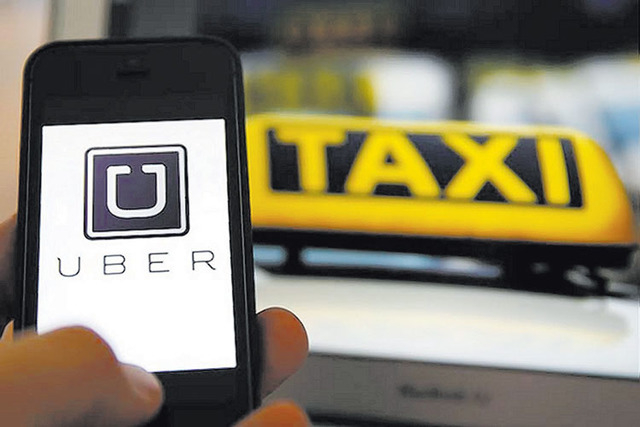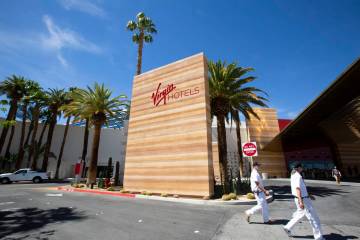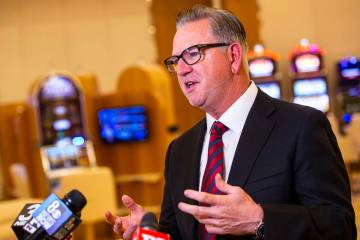Transportation leaders mum about proposed regulations
Maybe the key stakeholders in the conversation about how transportation network companies are going to operate in Nevada are playing coy.
Or, maybe they‘re just waiting to see what everybody else says before jumping into the process.
Whatever the reason, representatives of Uber, Lyft and the Southern Nevada taxicab and limousine industries aren‘t talking publicly about the 38-page, 149-section document on the regulation and licensing of transportation network companies published earlier this month by the Nevada Transportation Authority.
Count on the silence being broken Thursday when the authority conducts the first of two workshop meetings on the regulations, beginning at 9 a.m., at the Grant Sawyer Building. At stake is the legal starting date for ride-sharing companies that the public and millions of Las Vegas tourists have been clamoring for.
Authority commissioners Andrew MacKay, Keith Sakelhide and George Assad will be in Las Vegas for the hearing that is expected to take up much of the day. They‘ll do the same thing a week later in Carson City. Both sessions are being videoconferenced to both sites to gather testimony from Northern and Southern Nevada.
The end result would be a set of rules that will enable transportation network companies industry people just call them TNCs, to begin transporting customers.
The debate on TNCs, ride-hailing companies that use a smartphone application to connect a person needing a ride to a persons willing to give one in their own cars for a price, was hard-fought in the Legislature.
In the end, Gov. Brian Sandoval signed Assembly Bills 175 and 176 that established a framework for companies like Uber and Lyft to operate in the state, charging the authority with crafting the details in regulations.
The two workshop sessions are designed for the public to weigh in on what they think of the proposed rules. Most of the provisions of the laws Sandoval signed already spell out what TNCs will be allowed to do. But, as usual, the devil is in the details and authority commissioners will have to come up with rules meet the legislative intent while keeping TNCs and their rivals satisfied.
"It‘s going to be the Transportation Authority‘s responsibility to comport with the legislative intent of the bills that were passed," said Sen. James Settelmeyer, R-Minden, a sponsor to the Senate bill on TNCs that later was amended in the Assembly version.
Settelmeyer said he reviewed the proposed regulations, calling them "a starting point," but he expects a number of changes to occur before the first license is issued.
Settelmeyer, a member of the legislative commission that will review the authorityâs regulations before they are returned to the authority for final approval, said he‘d be happy to offer guidance on the legislative intent of the bills if disputes arise during the rulemaking process.
MacKay, the authority chairman, also expects a number of revisions to occur before rules are implemented.
"This first version is an attempt to spur discussion and weâre expecting to have a lot of dialog with the TNCs (transportation network companies)," he said. "I think they‘re going to provide us with a lot of valuable information."
But if those companies are going to provide that, they aren‘t in any hurry to do so.
MacKay last week said he hadnât received any written testimony. In addition, as of the end of last week, no company had even begun applying for licensure.
Representatives of Uber and Lyft arenât tipping their hands about what they think of the regulations.
"We‘re part of a process of what those regulations will look like,â said Eva Behrend, a spokeswoman for Uber.
Asked if the company would be happy with Nevada regulations if the current version is passed unchanged, she just said that the company is happy to be a part of the process.
The Limousine Operators Association, one of the opponents to the legislation allowing the companies to operate, had no comment on the proposed rules.
The legislation already spells out that TNCs must have at least $1.5 million in liability insurance coverage and that they‘re limited in how much they can charge passengers in the event of an emergency.
Uber was criticized for exercising its dynamic pricing model â also called âsurge pricingâ â during a hostage situation in Sydney, Australia. Using a supply-and-demand model that increases prices when demand is highest, Uber charged four times its normal rate when a gunman terrorized downtown Sydney and people were trying to get away.
In Nevada, TNCs would be prohibited from increasing prices by more than twice the normal rate during an emergency. But the Nevada law doesnât prohibit dynamic pricing as long as the company provides the customer with a cost estimate prior to the ride.
That‘s vastly different than taxi fares, which are set by the Nevada Taxicab Authority with one rate, monitored by meters, for all companies.
The state‘s law also requires background checks on drivers and inspections of vehicles, but not fingerprinting or drug testing.
Among the regulations that could be debated in workshop meetings are rules spelling out the price of admission to TNCs. The authority has proposed an application fee of $500,000, which could be reduced if a company imposes a fleet limitation on itself. The proposed regulation calls for a $10,000 fee for companies with 100 vehicles or less in the first year of operation, $50,000 for companies with 500 vehicles or less in the first year, $100,000 for 1,000 vehicles and $250,000 for 2,500 vehicles.
Once regulations are modified after the workshops, they‘ll be sent for legal review by the Legislative Counsel Bureau. Theyâll then be returned to the authority for adoption.
That‘s expected to occur by the authority‘s August meeting.
Contact reporter Richard N. Velotta at rvelotta@reviewjournal.com or 702-477-3893. Find @RickVelotta on Twitter.




























